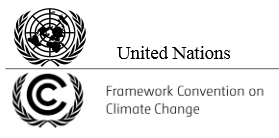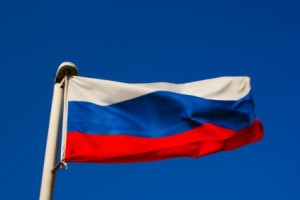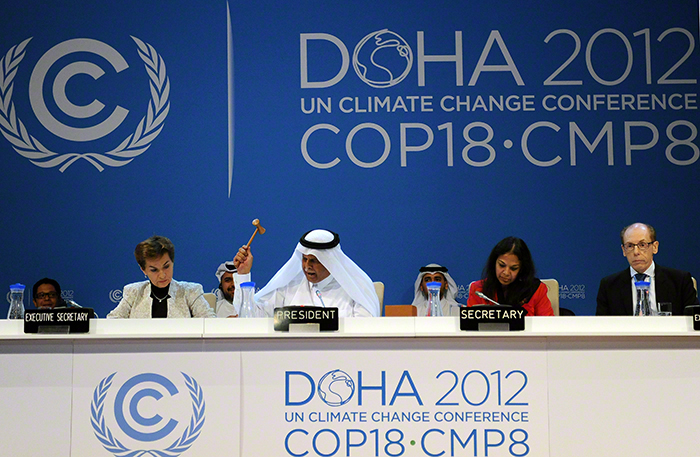Many who follow CFACT’s participation in the UN climate talks will recall that Russia blocked a crucial negotiating track at the UN’s subsidiary climate talks held in Bonn in June. The Russian move caused the most important part of the talks to collapse. No real business could be conducted. Read Climate talks Collapse!
In the topsy-turvy world of UN climate politics, Russia, joined by Ukraine, Belarus and other nations of the former Soviet Union have become the champions of democratic process.
On October 28th, Russia sent a strongly worded letter [Read it here] to the UNFCCC secretariat decrying the UN’s use of  “consensus” rather than permitting nations to vote on matters as important as conference outcomes. “Decision-making in the UNFCCC process has suffered evident setbacks over the past few years with serious procedural and legal flaws being multiplied, transparency eroding, frequency of dubious proceedings acquiring alarming magnitude and conduct of business deviating” from UNFCCC rules, Russia said.
“consensus” rather than permitting nations to vote on matters as important as conference outcomes. “Decision-making in the UNFCCC process has suffered evident setbacks over the past few years with serious procedural and legal flaws being multiplied, transparency eroding, frequency of dubious proceedings acquiring alarming magnitude and conduct of business deviating” from UNFCCC rules, Russia said.
“Consensus” has become perhaps the most abused word in the global warming dictionary. Many are familiar with the oft-repeated propaganda talking point claiming some huge number (97% being the latest) of scientists as being on board with extreme global warming views. The global warming consensus talking point has long been debunked, yet keeps cropping up. We even heard it recently from the lips of the President of the United States.
The “consensus” the Russians are talking about is still worse. Top officials at the climate talks, finding due process and democracy to be tiresome wastes of time, have dispensed with formal voting and resorted to gaveling through back-room agreements even on final conference outcomes.
As COP 18 in Doha drew to a close, the presiding officer gaveled down the Russian delegation which was furiously seeking to be recognized. Representatives of other countries including India, Venezuela, Bolivia report being denied recognition, threatened or coerced at prior conferences.
E.U. Climate Commissioner Connie Hedegaard was not sympathetic to Russia’s case saying, “It would be irresponsible and reckless if we let the Warsaw COP get dro wned in procedural issues. What we need to discuss is real action and real commitments. The rest – it’s not that it’s uninteresting but it should not be at the centre stage.” Commissioner Hedegaard appears ready to cede the sovereignty of nations and vast sums of money to the UN in the name of global warming with little regard for process and without voting.
wned in procedural issues. What we need to discuss is real action and real commitments. The rest – it’s not that it’s uninteresting but it should not be at the centre stage.” Commissioner Hedegaard appears ready to cede the sovereignty of nations and vast sums of money to the UN in the name of global warming with little regard for process and without voting.
Russia’s objections though noble in principle are actually motivated by national interest. As CFACT reported from Bonn, Russia is concerned with the “hot air” issue. Russia was not at all pleased when the UN COP pulled the plug in Doha on all the emissions credits Russia had acquired under the first Kyoto treaty and told Russia it couldn’t carry them forward. Russia, which has announced that it will not be part of a second commitment period for the Kyoto protocol and has signaled a reluctance to sign on in Paris, wants to keep its credits anyway. Russia would like to sell its old credits to the countries which do sign aboard and would be paid effectively for nothing but hot air.
Moreover, Russia accrued the carbon credits it is so set on retaining as a reward for its economy lagging behind the west’s during Russia’s long period of communism and it’s painful transition to the present. As CFACT observed in Bonn, the notion that Russia  deserves compensation for inflicting communism on Eastern Europe is bizarre at best. If anything, Russia should be compensating Poland, the rest of the Warsaw block and a host of developing nations which had their prosperity stymied by communism for generations.
deserves compensation for inflicting communism on Eastern Europe is bizarre at best. If anything, Russia should be compensating Poland, the rest of the Warsaw block and a host of developing nations which had their prosperity stymied by communism for generations.
As COP 19 opens tomorrow morning, we will learn more about whether Russia was able to gain sufficient concessions in closed negotiations before the conference to placate it. Will Russia drop or table its objections? Russia was willing to shut down a subsidiary meeting in Bonn. Is Russia willing to do the same to a full-blown UN conference of the parties?
If Russia drops its objections, could the Warsaw outcome and ultimately the UN’s long sought climate treaty of Paris be adopted with world nations never being given the opportunity of actually voting?

The truth will ultimately prove the IPCC kleptocrats to be nothing more than the Fascists wannabe’s they already emulate!
I’m tired of participating in society if society means being governed by lies using resources that have been stolen from the people. Why couldn’t bin ladens henchman targeted the UN instead of the trade towers? Might have avoided the constant wars because no one in the west, save the politicians, would’ve cared.
It seems the United Nations is determined to kill the global democracy dream! People really do need to stand up to this corrupt organisation that is determined to push its scientific fraud of man-made global warming alarmism on the global population in order to control our lives by controlling fossil fuel energy use.
Dear Ed, you may need to do a little more research on who`s agenda it has always been to finance Lenin and the bolsheviks in Russia , and in who`s way Nicholas 2nd – the last Russian Tsar was and why .You would have a different picture as to who has been spreading what and why.
When you mention the ‘spread of communism’ by Russia, it seems like they were spreading a plaque.
The fact is WE are living in the Police State of America Corporation with eroding values, corrupt government , corrupt Judicial system, terrible educational system, pharmaceutical corporations` paradise, genocide of the Native Americans , Drug and Child trafficing by the CIA, Prostitution, Alternative lifestyles popularized by ALL corporation-owned Media , yet we are having a huge overblown egos about being on top of the world . Russia is an amazing country with some awesome people living in it. Russia is a big country, big nation, great resources. West has so far attacked Russia 4 times…Russia not even once ! Napoleon ( where all of Europe more or less was united in the attack on Russia…yes, not just the French, there were Belgians, Spanish, Italians, Austrians, etc.), Ottoman (Muslim) and the UK and France attacked Russia in the Crimean War (imagine this, Muslims and the West work together to destroy Russia !, Hitler (where the UK, France did all they could to encourage Hitler to go East) and then NATO after the WW2 a Cold War declaration by the West. Four times. Russia has more freedom today, but you can`t see it from the propaganda the US serves you. When the US Gov officials try to coerce and intimidate other nations into doing things their way, it is done with the intent of creating or escalating tension so the media can report back home that we have “enemies” that oppose us and then use it as an excuse to pump in lots more money to the military industrial complex which creates lots of jobs and gadgets.The cabal wants profit.
It`s complicated in the background of the US-Russia relations because the US is waging imperial conquest of the world in which Russia is to play the role of a vassal…Russia obviously refuses to be a vassal , so the US gets mad…It is as simple as hell, really…
As long as the US pushes imperialist agenda on to Russia, Russia will high back, as long as Russia doesn`t accept the US imposed vassal outlook, problems and tensions will continue to exist for both countries. And the rest is just noise…
Who would have thought that the former free world would be supported by the USSR.The USA going the other way,thanks to Obuma.